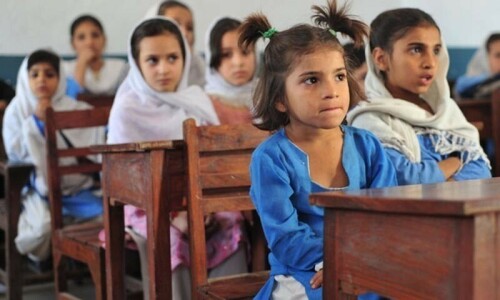ISLAMABAD: Federal Ombudsman Syed Tahir Shahbaz has said that his office has been working to improve the condition of prisons by changing mindsets and removing irritants in the criminal justice administrative system.
He said all the provinces have segregated drug users and mentally disabled prisoners, and they are receiving special attention and treatment. The provinces have also set up technical education and vocational centres in jails.
These matters were discussed in the seventh quarterly implementation report prepared by the Ombudsman Secretariat regarding progress made on the improvement of prisons. The report has been presented to the Supreme Court, which had tasked the Ombudsman Secretariat to work on this issue.
Mr Shahbaz held online meetings with four provincial chief secretaries or the relevant stakeholders, the inspectors general of prisons in Punjab, Khyber Pakhtunkhwa, Sindh and Balochistan and the Ministry of Interior in this regard.
The progress made by provincial and district oversight committees and welfare committees to improve the lives of prisoners - particularly, children, women and destitute prisoners - was discussed with stakeholders from all four provinces.
The provinces said they had already constituted district, welfare and provincial oversight committees that were meeting regularly while steps are also being taken to improve accommodation facilities in jails.
The Sindh government has notified amendments to the Sindh Prisons and Corrections Service Rules and the Sindh Prisons Correctional Act 2019, with the aim that the new laws will contribute to a peaceful atmosphere by confounding all prisoners to safe custody and ensuring their legal and basic rights as per international conventions.
Punjab has also constituted a high level parole board to scrutinise the eligibility of prisoners to be released on parole. The Parole Act 2019 has been approved and amendments to the Good Conduct Prisoners Probational Release Act will be placed in the Punjab Assembly for approval.
The KP government has amended its Good Conduct Prisoners Probational Release Rules 1927, and placed them before the assembly for approval.
New jails are being built to address overcrowding. Sindh has earmarked approximately Rs1.05 billion for jail renovations, Balochistan has allocated Rs250 million and Punjab has allocated Rs550m for renovations according to updated standards. In KP, reconstruction is underway in five jails.
The biometric system in Punjab jails has also been completed, and nine anti-terrorism courts have been connected to their respective jails for trials held over video link. KP has completed a prison management information system in seven jails and the remaining jails are being completed under a United Nations Office on Drugs and Crime (UNODC) programme.
Balochistan has also signed an agreement with the UNODC for a prison management information system.
Arrangements have been made to provide educational and technical courts to prisoners. The Punjab prisons department said that 241 prisoners have appeared in masters level programmes in the last five years, 425 in bachelors programmes, 878 in intermediate exams and 15,213 female and juvenile prisoners in qualified technical courses.
In KP, 578 prisoners have cleared exams of various levels, while 122 have received religious education certificates. In Sindh, most prisoners received technical education in various sectors.
All the provinces have also set up free legal aid programmes with the help of the UNODC and bar associations.
Published in Dawn, September 18th, 2020















































Dear visitor, the comments section is undergoing an overhaul and will return soon.